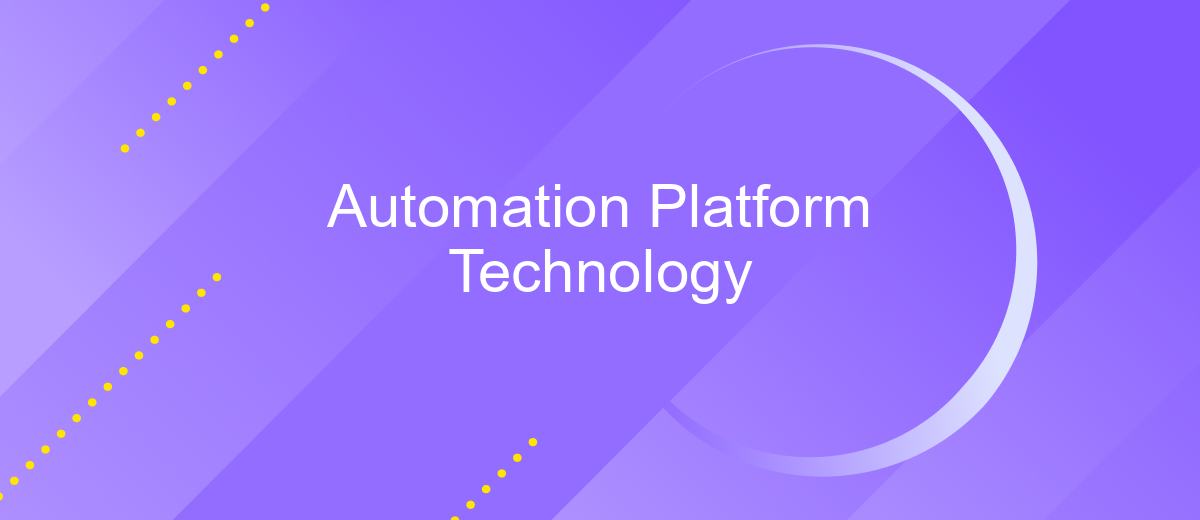Automation Platform Technology
Automation Platform Technology is revolutionizing the way businesses operate by streamlining processes and enhancing efficiency. These platforms integrate advanced tools and technologies, enabling organizations to automate repetitive tasks, reduce human error, and focus on strategic growth. From manufacturing to customer service, automation platforms are transforming industries, driving innovation, and offering a competitive edge in today's fast-paced digital landscape. Embracing this technology is crucial for future-ready enterprises.
Introduction
In the rapidly evolving digital landscape, automation platform technology has emerged as a pivotal force driving efficiency and innovation across various industries. These platforms integrate advanced tools and technologies to streamline processes, reduce human error, and enhance productivity. By automating repetitive tasks, organizations can allocate resources more effectively and focus on strategic initiatives that foster growth and competitiveness.
- Seamless integration with existing systems
- Enhanced data accuracy and consistency
- Reduced operational costs and time savings
- Scalability to adapt to business growth
- Improved compliance and risk management
As businesses strive to remain competitive in a fast-paced market, the adoption of automation platform technology becomes increasingly crucial. These platforms not only optimize operational workflows but also provide valuable insights through data analytics and machine learning. By leveraging these technologies, companies can make informed decisions, anticipate market trends, and deliver superior customer experiences. As such, embracing automation is no longer an option but a necessity for organizations aiming to thrive in the digital age.
Components and Functionality

The Automation Platform Technology encompasses a variety of components designed to streamline and optimize business processes. Core components include workflow automation engines, which facilitate the creation and management of complex workflows. These engines enable users to automate repetitive tasks, ensuring efficiency and consistency across operations. Additionally, data integration tools play a crucial role by connecting disparate systems and enabling seamless data flow. These tools often support a wide range of APIs, allowing businesses to integrate with numerous third-party applications effortlessly.
Another essential component is the user interface, which provides intuitive dashboards and reporting features, empowering users to monitor and analyze automated processes in real time. Moreover, platforms like ApiX-Drive enhance integration capabilities by offering user-friendly solutions for connecting various services without extensive coding knowledge. This service enables businesses to automate integrations swiftly, reducing the time and resources required for manual configurations. Overall, the functionality of an automation platform is centered around improving operational efficiency, reducing human error, and providing scalable solutions to meet evolving business needs.
Benefits and Use Cases

Automation platform technology has revolutionized how businesses operate, offering numerous advantages and practical applications across various industries. By streamlining processes and minimizing human intervention, these platforms significantly enhance efficiency and accuracy.
- Increased Productivity: Automation platforms handle repetitive tasks, allowing employees to focus on more strategic activities.
- Cost Reduction: By reducing the need for manual labor, organizations can lower operational costs.
- Improved Accuracy: Automated systems minimize human error, ensuring consistent and reliable outputs.
- Scalability: Automation platforms can easily adapt to growing business needs, supporting expansion without significant resource investment.
- Enhanced Data Management: These platforms facilitate efficient data collection and analysis, enabling better decision-making.
Use cases for automation platforms are diverse, spanning from manufacturing and logistics to customer service and marketing. In manufacturing, they optimize production lines, while in logistics, they streamline supply chain management. Customer service benefits from chatbots and automated support systems, enhancing user satisfaction. In marketing, automation platforms personalize customer interactions and manage campaigns efficiently, driving higher engagement and conversion rates. Overall, automation platforms are pivotal in modernizing operations and maintaining a competitive edge.
Market Landscape and Trends

The automation platform technology market is rapidly evolving, driven by the increasing demand for efficiency and scalability across industries. Companies are seeking solutions that streamline processes, reduce manual intervention, and enhance productivity. This shift is fueled by advancements in artificial intelligence, machine learning, and the Internet of Things, which are integral to modern automation platforms.
As businesses strive to remain competitive, they are adopting automation platforms to optimize operations and improve decision-making. The market is witnessing a surge in cloud-based solutions, offering flexibility and accessibility. Furthermore, the integration of automation with other technologies, such as big data analytics and blockchain, is creating new opportunities for innovation.
- Growing demand for AI-driven automation solutions.
- Increased adoption of cloud-based platforms for scalability.
- Integration with big data and blockchain technologies.
- Focus on enhancing cybersecurity within automation systems.
Looking ahead, the automation platform technology market is poised for significant growth. Organizations are expected to invest heavily in research and development to stay ahead of the curve. As automation becomes more sophisticated, it will play a crucial role in shaping the future of industries, driving efficiency, and fostering innovation.
- Automate the work of an online store or landing
- Empower through integration
- Don't spend money on programmers and integrators
- Save time by automating routine tasks
Future Outlook
The future of automation platform technology is poised to revolutionize industries by enhancing efficiency and reducing manual workloads. As businesses continue to embrace digital transformation, automation platforms will become increasingly sophisticated, integrating advanced AI and machine learning capabilities. This evolution will enable organizations to automate complex processes, making them more agile and responsive to market demands. The growing reliance on cloud-based solutions will further facilitate seamless integration and scalability, allowing businesses to adapt quickly to changing environments.
In this context, platforms like ApiX-Drive will play a crucial role by simplifying the integration of various services and applications. By providing user-friendly tools to connect disparate systems, ApiX-Drive empowers companies to automate workflows without extensive technical expertise. This democratization of technology will enable even small and medium-sized enterprises to leverage automation effectively, leveling the playing field in the competitive landscape. As security and data privacy concerns continue to rise, future automation platforms will also prioritize robust security measures, ensuring that businesses can innovate confidently and securely.
FAQ
What is an automation platform, and how does it work?
How can automation platforms benefit my business?
What types of tasks can be automated using an automation platform?
How do I choose the right automation platform for my organization?
Can I integrate my existing applications with an automation platform?
Strive to take your business to the next level, achieve your goals faster and more efficiently? Apix-Drive is your reliable assistant for these tasks. An online service and application connector will help you automate key business processes and get rid of the routine. You and your employees will free up time for important core tasks. Try Apix-Drive features for free to see the effectiveness of the online connector for yourself.


